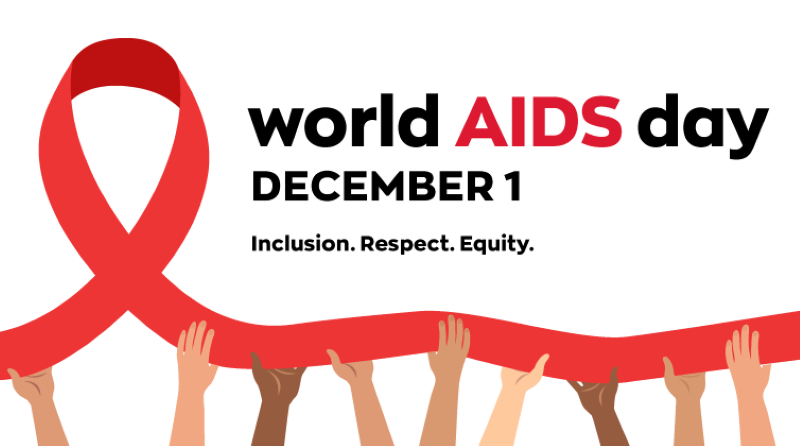
World AIDS Day
DECEMBER 1, 2023.
INCLUSION. RESPECT. EQUITY.
Ending AIDS will remain a pipedream without drug policy reform and the effective engagement of the community of people who inject drugs, according to the Global Commission on Drug Policy’s new report.
A Global Response
In preparation for World AIDS Day, the Global Commission on Drug Policy released a report emphasising a health and human rights-centred approach to the HIV and Hepatitis epidemics. Accompanied by a commentary in The Lancet, this report, HIV, Hepatitis & Drug Policy Reform, suggests drug policy reform and the meaningful involvement of drug users. This report features work from UNSW teams at NDARC and the Kirby Institute including Scientia Professor Degenhardt, AO, who emphasises the need for more intelligent policy responses to the multiple harms faced by people who inject drugs. According to Professor Degenhardt, “People who inject drugs are exposed to various and constantly changing risk environments and are at risk of contracting diseases such as HIV. Improved policies are essential to address these risks effectively.”
HIV, Hepatitis & Drug Policy Reform finds that despite the extraordinary progress made, for instance, over the past two decades in getting people living with HIV on antiretroviral treatment (ART), tripling globally from some 10 million to almost 30 million today, the situation for people who inject drugs living with the virus had improved little over the same period.
According to the report, for people who use drugs, punitive laws and policies create barriers to health services. Criminalisation often interferes with the provision of adequate HIV/viral hepatitis prevention, testing, diagnosis, or treatment. The criminalisation of drug use and possession has led to the mass incarceration of people who use drugs — sharply escalating their risks for HIV, HCV, and other adverse health outcomes, both while imprisoned and after release. Furthermore, people who use drugs are often stigmatised in healthcare settings and may avoid seeking needed care or services. These required care and services include OAT and housing, which, according to Scientia Professor Louisa Degenhardt, AO, in Global patterns of opioid use and dependence: harms to populations, interventions, and future action have been shown to reduce HIV and HCV incidence, yet remain poorly available in many countries.
This failure to scale up effective harm reduction interventions has contributed to very high rates of HIV and viral hepatitis among people who inject drugs. According to the global systematic review, Epidemiology of injecting drug use, prevalence of injecting-related harm, and exposure to behavioural and environmental risks among people who inject drugs, an estimated 15% of PWID (2.3 million) are living with HIV. More than half (52% or 7.8 million) have had an HCV infection at some point in their lives, while one out of five (39% or 5.7 million) have a current HCV infection, and one out of 12 (8% or 1.2 million) have a current hepatitis B (HBV) infection.
Read the full report and its recommendations here.
Australia a global leader.
Australia, amid such dire global statistics, is one of 11 countries “on track” to achieve 2030 HCV elimination targets, and so offers lessons for the world, particularly concerning its approach to people who use drugs. In Australia, 81,300 people are living with current HCV infection, and most new (90%) HCV cases occur among PWID. It is estimated that 75,000 people regularly inject drugs in Australia, with 12% having a current HCV infection.
Australia’s response to the Hepatitis C Virus (HCV) has succeeded due to its strong partnerships and national strategies. Since the 1980s, community advocates have been the driving force behind Australia’s response to HIV, leading the country to become a global leader in the fight against the epidemic. The cooperation between both political sides in responding to HIV and AIDS in the 1980s paved the way for effective partnerships between people living with HIV, their communities, healthcare providers, researchers, and the government.
At the time, it was unusual for political parties to agree, but it was crucial in reducing the transmission of HIV. This agreement led to the development of a national HIV/AIDS strategy, the establishment of needle and syringe programs, the creation of public health campaigns, the setting up of state and territory AIDS councils, and the founding of organisations for people living with HIV. Additionally, Australia was one of the first countries to provide broad access to direct-acting antiviral HCV therapies, with no restrictions based on disease stage, drug/alcohol use, or prescriber type. As of 2022, over 105,000 people have received treatment.
On November 30th, Health Equity Matters, a federation of Australia’s leading HIV and LGBTIQA+ health organizations, strongly endorsed the recommendations of Australia’s HIV Taskforce’s latest report. The report, led by Health Minister Hon. Mark Butler and Assistant Health Minister Hon. Ged Kearney, charts a clear and practical path towards ending HIV transmission by the end of this decade. The report recommends several measures to achieve this goal:
- Making the HIV prevention pill, PrEP, more readily available and boosting its use
- Expanding HIV testing among hard-to-reach populations
- Reducing financial barriers to treatment
- Driving greater awareness of HIV and fighting stigma by working with peak HIV bodies such as Health Equity Matters and the National Association of People with HIV Australia to develop a communication strategy through to the end of the decade
- Working with states and territories to promote reforms to laws that criminalise people with HIV
Professor Degenhardt, AO, was the lead academic on the Secretariat for the Reference Group to the United Nations on Injecting Drug Use and HIV (2007-2010) and continues to work with WHO, UNAIDS and UNODC examining the epidemiology of illicit drug use and associated health risks across the globe.
Sources:
Global Commission on Drug Policy New Report
Media enquiries:
Laura Daniels
Email: ndarc.media@unsw.edu.au
Tel: 0401 713 850
